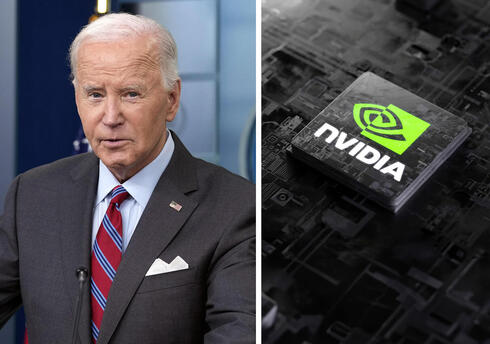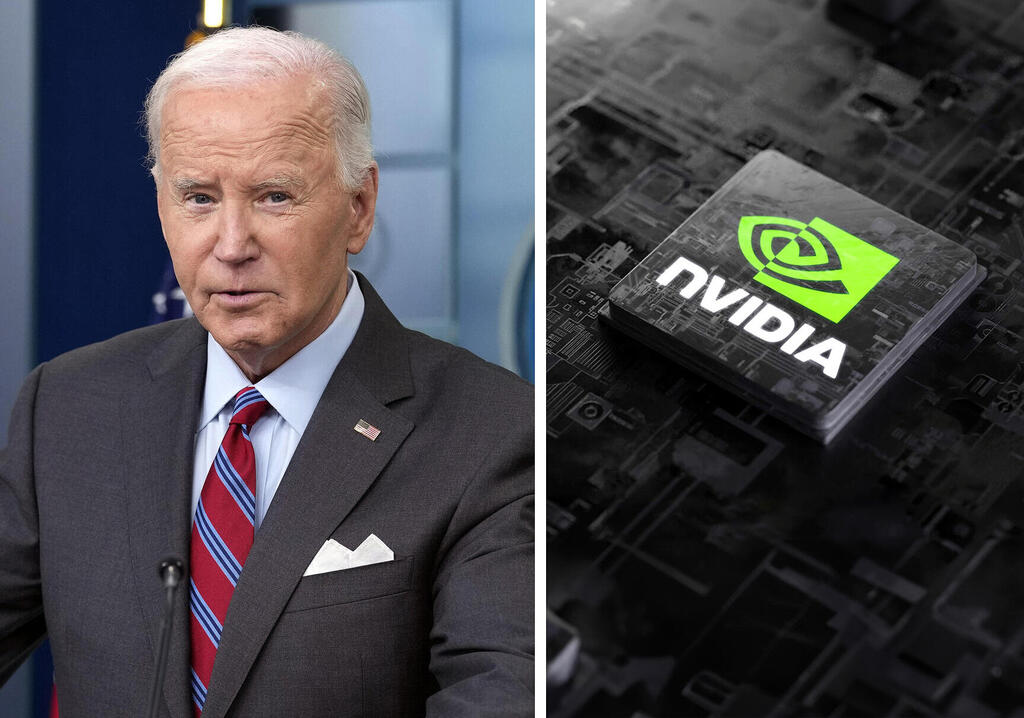
Israel faces AI crisis under new US export regulations
Restrictions on AI computing power may leave Israel lagging behind in global innovation.
In exactly one week, a new president will be sitting in the White House. But before that happens, today (Monday), U.S. President Joe Biden published a new set of restrictions on the export of artificial intelligence (AI) chips, which will affect almost all the countries of the world, including Israel. These restrictions will limit the extent of AI computing power that countries can possess. This move, say sources in the local market, may completely eliminate Israel's ability to compete in the field of artificial intelligence and severely damage the willingness of international technology companies to establish large computing centers and carry out significant AI projects in Israel. The good news: President-elect Donald Trump will have the opportunity to repeal the regulation before it takes effect.
In the past two years, the Biden administration has led a series of moves designed to limit the export of artificial intelligence capabilities to China. However, today the government published a new set of restrictions, which are broader and more severe. These limitations address the export of AI processors to various countries and regulate the AI computing power each country is allowed to possess.
The new rules divide the world into three tiers. No restrictions will be imposed on first-tier countries, which include the U.S. and 17 other nations such as Belgium, Canada, Australia, Denmark, France, Germany, and the United Kingdom. Third-tier countries, which include the 25 nations already under U.S. arms embargoes—such as China, Russia, Iran, and North Korea—will be completely prohibited from importing AI processors.
Israel, along with 150 other countries like Poland, Mexico, Singapore, and the United Arab Emirates, is classified as a second-tier country. While AI chip exports to these countries will still be permitted, they will be subject to strict limitations on computing power (it is unclear whether this will be a uniform threshold or tailored to each country). Additionally, any export of an AI processor or a processor with AI capabilities (such as graphics processors for gamers) will require a cumbersome approval process from the U.S. Department of Commerce to ensure the computing capacity limits are not exceeded.
According to the administration, the primary goal of the regulation is to limit the ability of China and other adversarial nations to develop advanced AI technology. A broader objective is to position the U.S.'s closest allies as the preferred locations for tech companies to establish data centers and supercomputers, ensuring that control over AI technology remains within the U.S. and its allied nations. By doing so, the administration aims to prevent wealthy countries, such as Saudi Arabia and the United Arab Emirates, from leveraging their substantial financial resources to become global hubs for artificial intelligence.
"The U.S. has to be prepared for rapid increases in AI's capability in the coming years, which could have a transformative impact on the economy and on our national security," U.S. National Security Adviser Jake Sullivan said.
This move is expected to severely damage, possibly to the point of paralysis, the AI industry in Israel. "This will have a very significant impact on Israel," market sources said. "Limiting the country’s computing power is a major blow. These technologies are already embedded in millions of computers today. Every processor destined for Israel will need approval from a U.S. regulator, delaying research, data center construction, and the provision of cloud services. Every AI processor will require separate approval."
In effect, the sources said, the Biden administration is designating winners and losers in the race for artificial intelligence: first-tier countries that will enjoy unrestricted AI computing power versus second- and third-tier countries burdened by heavy regulation. Companies in Israel will theoretically be able to purchase cloud services for AI needs from first-tier countries, but they will compete with 150 other nations for the same resources—some of which have far more financial clout than Israel.
The result could make it nearly impossible for local AI startups to operate, significantly increase costs for larger companies, and harm Israel’s appeal as a destination for building computing centers or launching major AI projects. In other words, the new regulation could effectively wipe out AI activity in Israel.
The only silver lining is that the Biden administration has built in a 120-day period between the publication of the regulation and its enforcement, giving Trump the opportunity to block the move or upgrade Israel to the first tier.
Nvidia, the world’s leading developer and marketer of AI processors, sharply criticized the administration’s planned policy. “For decades, leadership in computing and software ecosystems has been a cornerstone of American strength and influence worldwide. The federal government has wisely refrained from dictating the design, marketing and sale of mainstream computers and software — key drivers of innovation and economic growth,” wrote Ned Finkle, vice president of government affairs at NVIDIA. “The first Trump Administration laid the foundation for America’s current strength and success in AI, fostering an environment where U.S. industry could compete and win on merit without compromising national security. As a result, mainstream AI has become an integral part of every new application, driving economic growth, promoting U.S. interests and ensuring American leadership in cutting-edge technology.
“Today, companies, startups and universities around the world are tapping mainstream AI to advance healthcare, agriculture, manufacturing, education and countless other fields, driving economic growth and unlocking the potential of nations. Built on American technology, the adoption of AI around the world fuels growth and opportunity for industries at home and abroad.
“That global progress is now in jeopardy. The Biden Administration now seeks to restrict access to mainstream computing applications with its unprecedented and misguided “AI Diffusion” rule, which threatens to derail innovation and economic growth worldwide.
“Although the rule is not enforceable for 120 days, it is already undercutting U.S. interests,” Finkle added. “As the First Trump Administration demonstrated, America wins through innovation, competition and by sharing our technologies with the world — not by retreating behind a wall of government overreach. We look forward to a return to policies that strengthen American leadership, bolster our economy and preserve our competitive edge in AI and beyond.”














